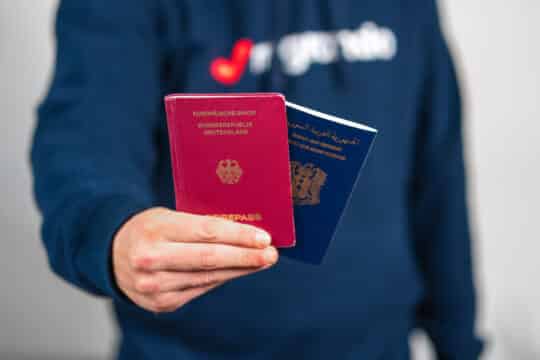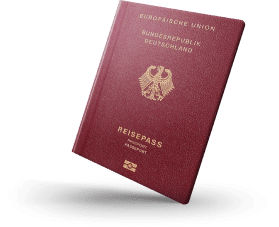What is the declaration of repentance in Eritrea? Definition and legal background
The declaration of repentance is an official document required by the Eritrean government from those citizens who have fled abroad, especially those who have not completed their compulsory national service or are suspected of having left the country illegally.
This document has a profound impact on the lives of many Eritreans worldwide.
Definition - Statement of remorse: A statement of remorse is a written confession in which the signatory admits to having committed a criminal offense by violating state laws - in this case, compulsory national service or leaving Eritrea illegally. The document also requires consent to any penalties or conditions that may be imposed upon return to Eritrea or upon application for Eritrean documents from abroad.
Historical context
- Compulsory national service was introduced in Eritrea shortly after independence from Ethiopia in 1991.
- Originally intended as a means of promoting national unity and development, over time it became one of the main reasons for the mass exodus of Eritreans, mainly due to the often indefinite length of service and the reported harsh conditions.
- The declaration of repentance was introduced in response to the increasing number of refugees leaving the country, often in search of protection or better living conditions abroad.
Reasons for the introduction
- Control and surveillance: The Eritrean government introduced the declaration of repentance to monitor and control Eritreans abroad who had left the country by evading national service.
- Financial interests: Through the declaration of repentance and the associated diaspora tax, the government can claim financial resources from Eritreans living abroad.
- Deterrence: It also serves as a deterrent against illegal departure and is intended to prevent citizens from evading national service.
These measures reflect the complex situation in Eritrea, which is often viewed critically by international observers, particularly with regard to the human rights situation and the freedom of citizens.
Process and requirements for the submission of Eritrea's declaration of repentance
The declaration of repentance plays a central role in the passport procurement process for Eritrean citizens living abroad. This document is part of a complex administrative procedure introduced by the Eritrean government for its citizens living abroad.
The passport issuing process is explained below, including the necessary requirements.
Requirements for the issuance of an Eritrean national passport
Applying for an Eritrean passport requires the fulfillment of specific requirements aimed at verifying the applicant's identity and confirming his or her obligations to the Eritrean state.
Identity card and diaspora tax:
- Every applicant must present a valid Eritrean identity card.
In addition, payment of the so-called diaspora tax is required, which amounts to 2% of the income earned abroad.
The content of the declaration of repentance
- The declaration of remorse requires applicants to admit that they have committed a criminal offense by failing to fulfill their national service obligation or by leaving Eritrea illegally.
- They must declare their willingness to face the legal consequences of these actions.
Passport issuing process
The passport issuance process for Eritrean citizens abroad involves several steps that must be followed carefully:
1. submission of the application documents:
- Applicants must submit their identity card, proof of payment of the diaspora tax and the completed declaration of repentance to the relevant Eritrean embassy or consulate.
2. review of the documents:
- The Eritrean authorities will check the completeness and accuracy of the documents submitted. This may include a review of the information provided in the declaration of repentance.
3. issue of the passport:
- Once the documents have been successfully checked, the passport will be issued. This step can take different lengths of time depending on the individual case.
4. receipt and use of the pass:
- The issued passport enables Eritrean citizens to enter and leave the country legally and to make use of consular services abroad.
This process underlines the importance of the declaration of repentance as a crucial element in the relationship between the Eritrean diaspora and the Eritrean government. The requirement of such a declaration has not only legal but also profound personal and social implications for those affected.

Legal framework of the declaration of repentance: effects on Eritrean refugees
The declaration of repentance, a requirement demanded by the Eritrean government before a passport can be issued, has led to legal discussions and several court rulings in Germany.
These judgments have contributed significantly to the understanding of the unreasonableness of the declaration of remorse and its influence on asylum and protection rights in Germany.
German court rulings on the unreasonableness of the declaration of remorse
Various German courts have dealt with the issue of the declaration of repentance and have ruled in several cases that the requirement to make such a declaration is unreasonable for Eritrean citizens. The relevant aspects of these judgments include:
- Recognition of the risks:
The courts have recognized that making a statement of repentance can expose Eritrean nationals to significant risks, including the risk of repression and prosecution upon return to Eritrea.
- Effects on the right of asylum:
This case law has made it clear that Eritrean citizens seeking asylum in Germany are not obliged to submit a declaration of repentance in order to prove their identity or nationality.
- Examples of important judgments:
In a landmark ruling of 11.10.2022, the Federal Administrative Court confirmed the unreasonableness of the declaration of repentance for Eritrean nationals with protection status and underlined the need for protection of applicants without a passport.
State and administrative courts have ruled similarly, emphasizing the importance of personal safety and the inadmissibility of requiring a statement of remorse.
Influence on asylum and protection rights in Germany
The court rulings on the declaration of repentance have far-reaching consequences for the asylum and protection rights of Eritrean citizens in Germany. They underline the need to deal sensitively with the special situation of Eritrean applicants and have the following consequences:
- Reinforced protection:
The recognition of the unreasonableness of the declaration of repentance contributes to the protection of Eritrean citizens by enabling them to apply for asylum without the fear of negative consequences.
- Assessment of credibility:
The rulings have also influenced the assessment practice in asylum procedures, particularly with regard to the credibility of applicants who are unable to present a passport.
- Guidelines for authorities:
They provide clear guidelines for the Federal Office for Migration and Refugees (BAMF) and other authorities when dealing with Eritrean citizens and their documentation.
The decisions of German courts on this issue represent an important step in recognizing the complex situation of Eritrean refugees and have a significant influence on the practice of asylum law in Germany.
Practical example of dealing with the Eritrea declaration of repentance in Germany
An Eritrean citizen with subsidiary protection in Germany applied for a travel document for foreigners, but refused to sign the declaration of repentance required by the Eritrean embassy, as this would mean self-incrimination of a criminal offense.
The Foreigners' office rejected his application and justified this by stating that obtaining a passport at the Eritrean embassy was not considered unreasonable for persons with subsidiary protection status, as the Federal Ministry of the Interior had stipulated.
The Schleswig-Holstein Administrative Court ruled in favor of the Eritrean, as the self-incrimination was considered a reason for the unreasonableness of obtaining a passport.
In its decision, the court argued that the signing of the declaration of repentance, which constituted self-incrimination, was unreasonable and ordered the passport to be issued without this condition.
Certification of the unreasonableness of obtaining a passport
Due to the Eritrean embassy wrongly requesting a declaration of repentance from you, it is impossible for you to obtain a passport. It is not enough to contact the respective embassy. The embassies will not respond and you will be stuck.
Nevertheless, the contact is important as evidence. You will not receive written proof of the contact from the embassy. This would be important to prove the situation. You can obtain legal evidence by collecting supporting documents. A lawyer can prove that they have been trying to obtain passports for some time and have not been successful.
We at Migrando have a lot of experience in this area and a unique position in Germany. In this way, we can prove that obtaining a passport is not reasonable for you as an Eritrean. It is important for acceptance by Foreigners' office that it is made clear why your passport procurement does not work.
Clarification of identity without a declaration of remorse Eritrea?
Risks and consequences of the declaration of remorse
The decision to make a declaration of repentance is associated with considerable risks and consequences for Eritrean citizens, not only for the applicants themselves, but also for their families. These risks affect both individual freedom and the collective security of the Eritrean diaspora.
Potential risks when applying for official documents
Applying for official documents under the condition of submitting a declaration of remorse involves various risks:
- Surveillance and repression: By submitting a statement of repentance, Eritrean citizens could come under the radar of the Eritrean government, which can lead to increased surveillance and possible reprisals.
- Criminal prosecution upon return: The admissions contained in the declaration could serve as a basis for criminal prosecution in the event of a possible return to Eritrea.
- Intimidation and pressure: The process can contribute to an atmosphere of intimidation in which Eritrean nationals abroad are subject to pressure, both from the authorities in their home country and within the diaspora community.
Impact on applicants and their families
The decision to make a declaration of remorse and the associated risks have far-reaching consequences:
- Psychological stress: The fear of possible repression and the stress of the process can have a significant psychological impact on applicants and their families.
- Social isolation: Victims may feel isolated within their communities, especially if they choose not to make a statement of remorse.
- Economic uncertainty: The uncertainty associated with the declaration of repentance can have a negative impact on the economic situation of the person concerned, especially if it is dependent on the issue of important documents.
- Family reunification: The difficulties in obtaining passports and other documents can delay or prevent family reunification, leading to long separations and emotional distress.
These risks and consequences underline the complexity of the situation faced by Eritrean citizens and the need for an informed and sensitive approach to the declaration of repentance.
It is crucial that the international community and affected individuals are aware of the potential consequences and act accordingly to protect their rights and well-being.
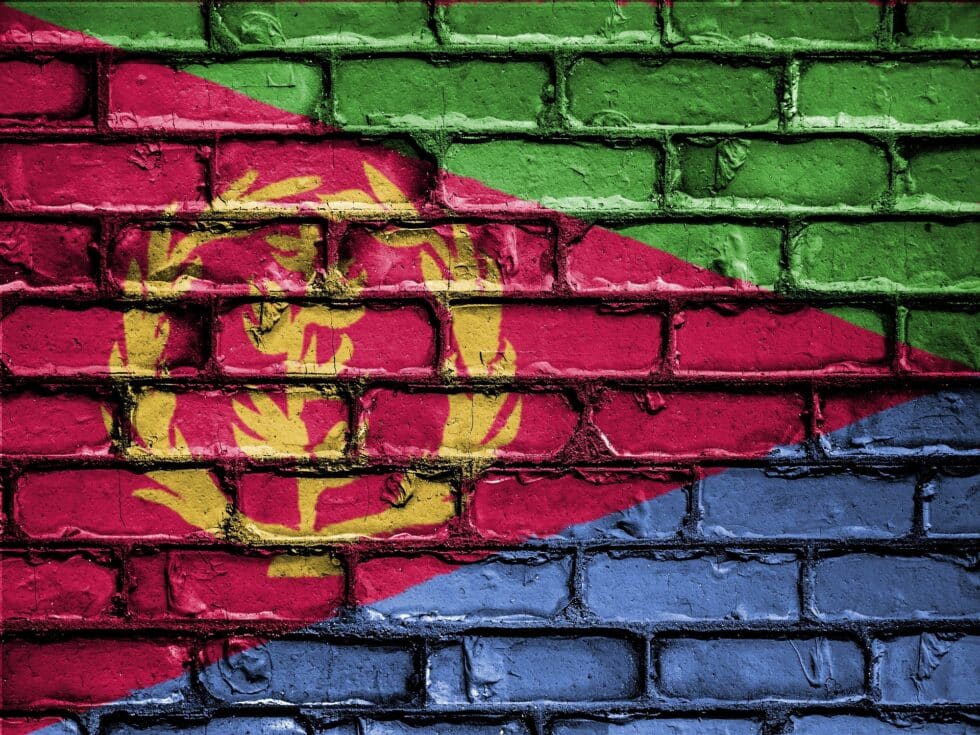
Alternative proof of identity for the declaration of repentance in Eritrea
For Eritrean nationals faced with the challenges and risks of declaring repentance, knowledge of alternative proof of identity is crucial.
These alternatives can be a valuable option for overcoming the necessary legal and administrative hurdles, especially in the context of applying for asylum or obtaining a passport. Two of the most important alternative documents are the birth certificate and the baptismal certificate.
Birth certificate as a fundamental identity document
- Universal recognition: The birth certificate is recognized worldwide as basic proof of identity. It contains essential information such as name, date and place of birth and the names of the parents.
- Uses: This document is particularly useful for official matters, visa applications, enrolling children in school and many other formal processes.
Baptismal certificate as additional proof of identity
- Supplement to the birth certificate: In cases where a birth certificate is not available or difficult to obtain, a baptismal certificate can serve as a supplementary document.
- Relevant information: Similar to the birth certificate, the baptismal certificate contains important personal information that can help confirm identity. It may also contain details of the date and place of baptism and the godparents, providing additional points of identification.
Significance for Eritrean citizens
- Significance: For Eritrean citizens who may not want or be able to make a declaration of repentance, these alternative documents are an important way of proving their identity and going through legal processes.
- Challenges in obtaining: It should be noted that obtaining these documents may vary depending on the individual situation and the accessibility of the Eritrean authorities. Nevertheless, they offer a potential solution for those who do not wish to expose themselves to the risks of declaring repentance.
Knowing and using alternative means of identification is a crucial step for Eritrean citizens to protect their rights and navigate administrative processes without exposing themselves to unnecessary risks.
The community and supporting organizations play an important role in informing those affected about these options and providing them with access to the necessary documents.
Step-by-step plan for obtaining a passport
If it is proven that you cannot reasonably be expected to obtain a passport as an Eritrean national, you do not have to make a declaration of repentance. The so-called step-by-step plan now applies.
In first place is a valid national passport and in second place an expired national passport. If you are unable to obtain either of these documents, you will be taken to stage 3. Stage 3 concerns possible biometric documents.
If you are unable to obtain biometric documents, this is followed by stage 4. Stage 4 concerns the procurement of documents such as birth certificates, marriage certificates or driving licenses. If you can prove that it is not possible to obtain level 4 documents either, you will move on to level 5. In the penultimate level, all other possible documents that can prove your identity can be obtained.
If this is also not feasible, then there is also the option of having witnesses testify in accordance with § 26 Para. 1 S.1 and 2 VwVfG in order to prove your identity. In the best case, this is done by a family member and an affidavit. Alternatively, a DNA test also works.
If this does not work either, a residence permit or Settlement permit or Naturalization will be issued without a passport and without Clarification of identity.
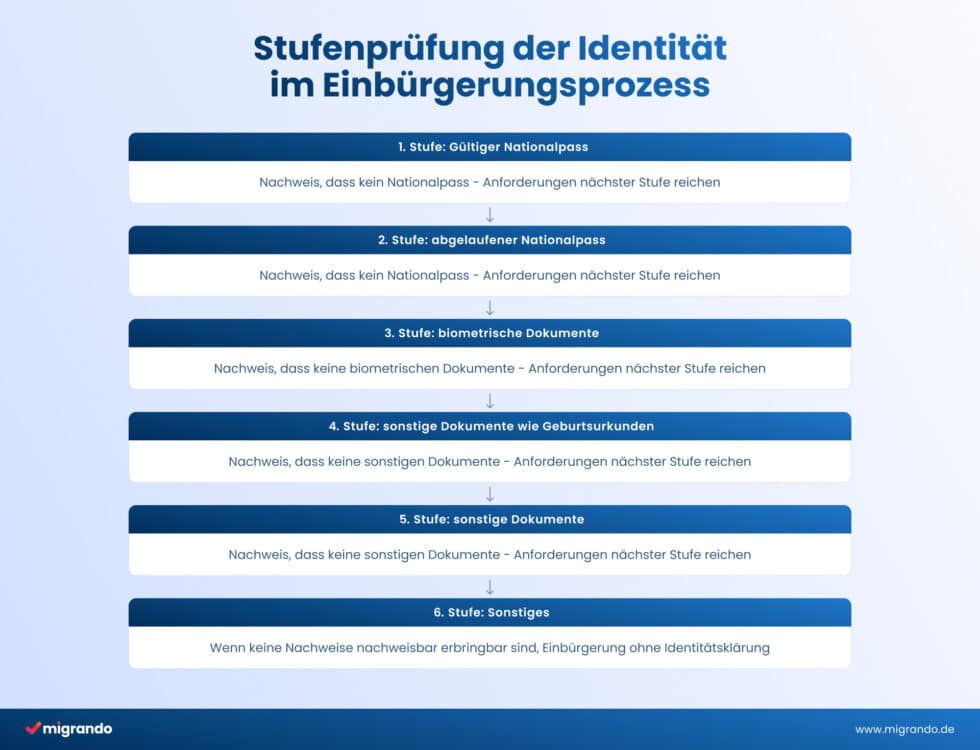
Settlement permit without declaration of remorse
Settlement permit without a declaration of remorse is a process in which various documents and procedures must be observed. From the general requirements for Settlement permit in accordance with Section 9 AufenthG to the documents for Clarification of identity.
Path to Settlement permit without declaration of remorse
The path to Settlement permit without a declaration of remorse begins with the application to Settlement permit, followed by a request to fulfill various requirements, including proof of identity by obtaining a passport.
After proving the subjective unreasonableness of obtaining a passport, alternative routes to Clarification of identity must be taken in accordance with the step-by-step plan, including biometric documents, birth certificates and witness statements. If all avenues of Clarification of identity are exhausted, Settlement permit will be issued without proof of identity, but on the condition that all other documents for Settlement permit are available and the application is reviewed.
Documents for Settlement permit without a declaration of remorse
Documents for Settlement permit without a declaration of remorse:
- Proof of legal residence in Germany for 5 years.
- Proof of means of subsistence.
- Proof of 60 compulsory pension insurance contributions.
- Proof that you pose no danger to the state (police clearance certificate).
- Proof of sufficient living space.
- Proof of permission to work or proof of an employment contract.
- Proof of sufficient knowledge of German.
- Proof of the naturalization test.
- Proof that obtaining a passport is unreasonable due to a declaration of remorse.
- Proof of alternative identity documents or witness statement or proof that the identity could not be clarified according to the step-by-step model.
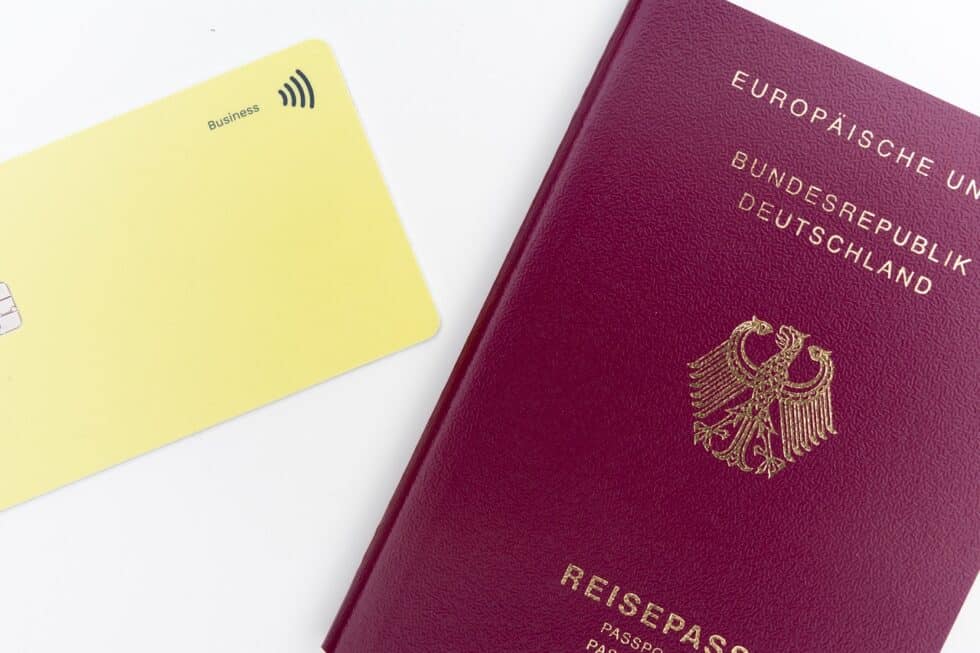
Naturalization without declaration of remorse Eritrea
The procedure for Naturalization without a declaration of remorse is similar to that for Settlement permit without a declaration of remorse Eritrea. Here, too, it is important to collect as much evidence as possible for the Clarification of identity . The issue of Clarification of identity is more complicated for you as an Eritrean at Naturalization than it is for other nationalities, where the passport procurement process does not involve similar problems.
Path to Naturalization without a declaration of remorse
The path to Naturalization without a declaration of regret Eritrea starts with making an appointment at your immigration office to submit the documents for the Naturalization must be arranged. You will receive instructions from the authorities as to which documents must be submitted.
In order to clarify your identity, you must prove that you cannot reasonably be expected to obtain a passport from the Eritrean embassy due to your declaration of repentance. After providing this proof, you must go through all the steps to Clarification of identity in accordance with the step-by-step model and document the attempts.
If neither the various stages nor a witness statement lead to clarification of the identity, Naturalization is carried out without formal Clarification of identity. It is important that every step is documented so that it can be traced by the immigration office.
Documents required for the application
The necessary documents consist of the documents required for Naturalization and the evidence for Clarification of identity .
- Legal residence of 8 years (with new naturalization law from summer 5 years).
- Language certificate B1
- Signed declaration of loyalty and commitment to the free democratic basic order
- Proof of successful naturalization test
- Proof of why it was unreasonable to obtain a passport (detailed documentation) and, if possible, alternative identity documents.
- Naturalization application form
Summary of the most important findings
- The declaration of repentance represents a significant hurdle: For Eritrean citizens, especially those abroad, the declaration of repentance constitutes a serious challenge that is associated with profound personal and legal risks. In addition, the declaration constitutes self-accusation of a criminal offense.
- Legal disputes in Germany: In Germany, court rulings have emphasized the unreasonableness of the declaration of repentance, setting important precedents for the protection of the rights of Eritrean refugees and migrants.
- Alternatives offer solutions: The possibility of using alternative proof of identity such as birth and baptismal certificates offers affected Eritrean citizens practical ways of overcoming the bureaucratic and legal challenges.
In conclusion, dealing with the declaration of remorse and its consequences is an ongoing process that presents both those affected and their supporters with new challenges.
Nevertheless, the legal successes and the identification of alternative solutions offer reason for hope. Through continued commitment and solidarity, an important contribution can continue to be made to protecting and promoting the rights of Eritrean citizens.
Naturalization without a declaration of remorse?
FAQ - Frequently asked questions about the declaration of regret
Yes, it is possible to apply for a visa without making a declaration of regret, especially in countries that recognize the problematic nature of this requirement. However, applicants should be prepared to provide alternative proof of identity to confirm their identity and nationality.
The possibility of deportation depends on various factors, including residence status and the outcome of the asylum procedure. However, German courts have recognized the risks and unreasonableness of declaring remorse, which in many cases offers protection from deportation. Nevertheless, each case should be considered individually and legal assistance is essential in such situations.
Accepted alternative documents include birth certificates, baptismal certificates and, in some cases, documents from recognized international or local NGOs that can confirm a person's identity. It is important that the documents presented are authentic and, where possible, bear official seals or endorsements.
The declaration of repentance can affect family reunification processes, especially when Eritrean nationals abroad try to apply for visas or residence permits for their family members. A clear explanation of alternative ways to fulfill the requirements can provide support here.
In some cases, minors, persons with recognized refugee status or persons seeking protection for humanitarian reasons may be exempt from the requirement. The exact conditions vary depending on the legal situation in the country of residence.
For people who have problems obtaining the necessary documents, it is advisable to contact NGOs, legal advisors or the Eritrean community to find support and possible solutions.
Eritrean embassies and consulates are usually the points of contact for issuing passports and other official documents. Their role and requirements, including the declaration of repentance, may vary depending on the country. Critical consideration and advice are essential here.
In countries that recognize the issue of declaration of remorse, refusal to make such a declaration should not negatively affect the residence status, especially if the status is based on protection grounds. Nevertheless, individual counseling is important to ensure that all legal aspects are taken into account.


